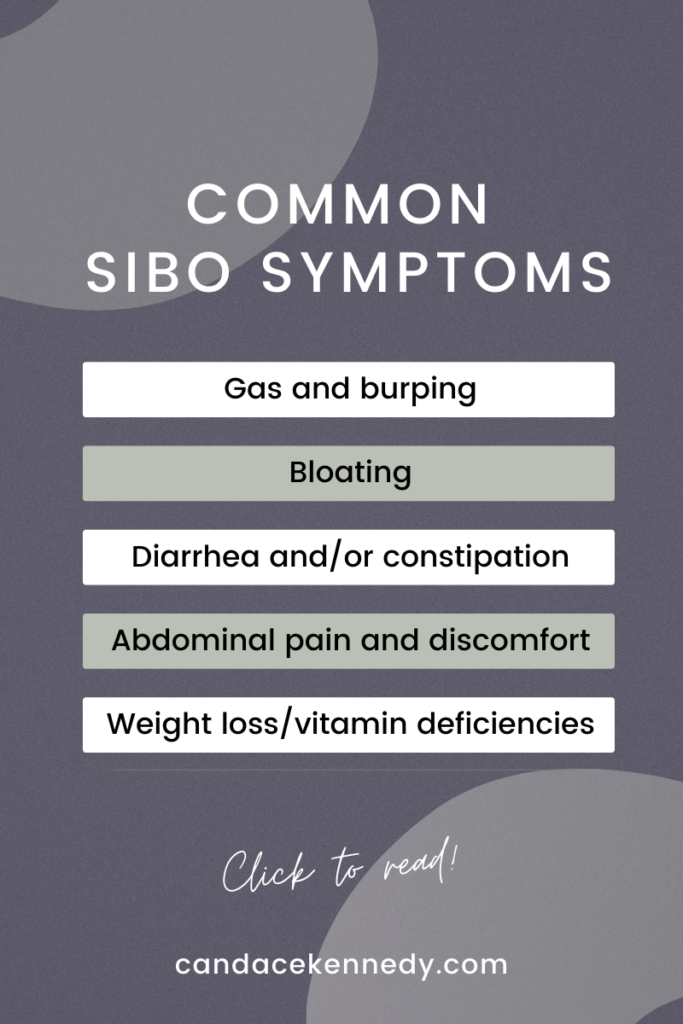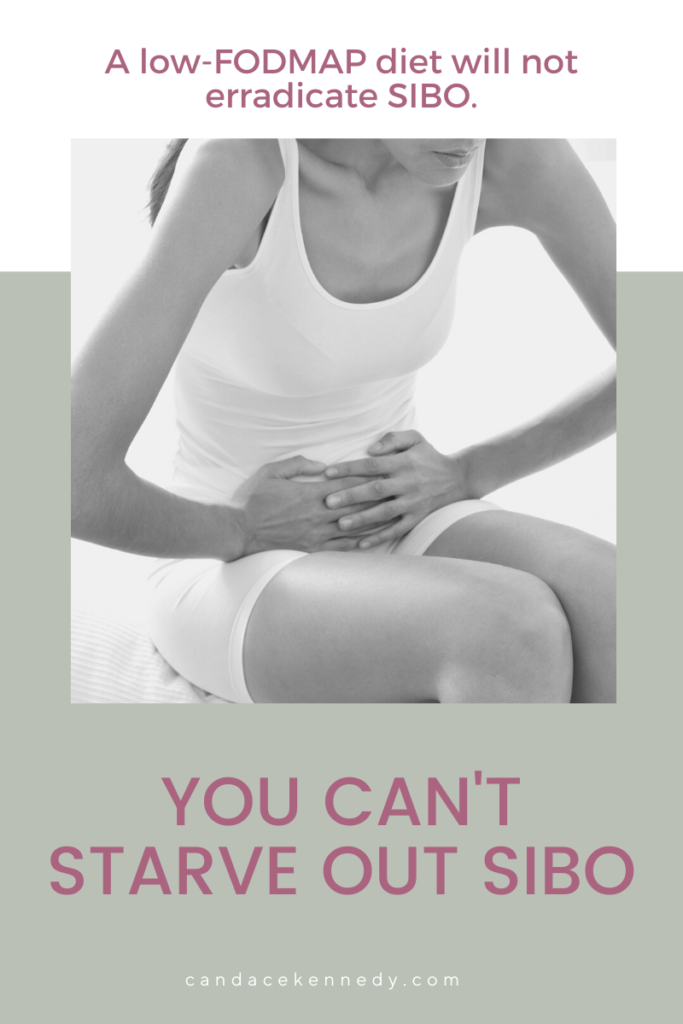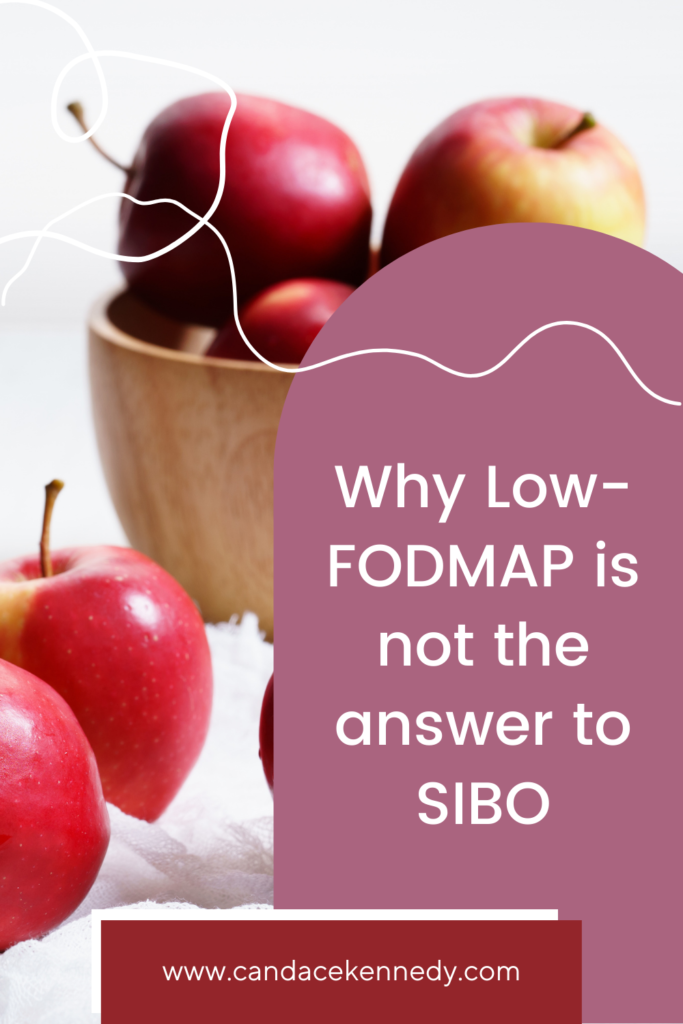So you’ve been diagnosed with SIBO, Small Intestine Bacterial Overgrowth. Now what? You may have heard from a practitioner or come across the low-FODMAP diet in your own research. While it’s true that low-FODMAP can be effective at reducing symptoms associated with SIBO, the diet alone is not going to clear the overgrowth.
In this post, you’ll learn why I don’t typically incorporate the low-FODMAP diet into clients’ SIBO protocols and what to do instead.
What is SIBO?
SIBO, Small Intestine Bacterial Overgrowth, is just like what it sounds like, an overgrowth of bacteria in the small intestine, where bacteria shouldn’t be. While the large intestine should be full of bacteria (hopefully, mostly the beneficial kind), the small intestine should be mostly sterile.
SIBO causes a wide range of gut (and non-gut related) symptoms, but prevalent are things like bloating, nausea, reflux/GERD, abdominal pain, diarrhea, and constipation. However, it’s important to note that not all SIBO sufferers have GI symptoms.
If you’re thinking those symptoms sounds a lot like IBS (irritable bowel syndrome), there’s a reason. Up to 78% of unexplained IBS has been linked to SIBO, So there is often confusion as to whether GI symptoms are IBS or SIBO. But when someone has a few or all of these symptoms, testing for SIBO is an appropriate next step.
The Root Cause is Not the Bacteria:
The root cause of SIBO is NOT the bacteria. Bacteria in the digestive tract is normal and many strains of bacteria are a healthy part of the gut microbiome. Some strains of bacteria associated with SIBO are not inherently “bad.” The issue is the small intestine, unlike the large intestine, should be mostly free and clear of bacteria. The small intestine is actually relatively sterile.
What happens with SIBO is that opportunistic bacteria travel into the small intestine, where it doesn’t belong, and start to proliferate there, leading to an overgrowth. So you see, it’s not just the presence of bacteria in the digestive tract that’s the issue. The issue is the body’s environment that allowed the bacteria to overpopulate in the wrong spot.
What is the low-FODMAP diet?
If you’ve done any digging into SIBO, you’ve probably come across information about the low-FODMAP diet which involves drastically reducing consumption of FODMAP-containing foods. FODMAP stands for fermentable oligosaccharides, disaccharides, monosaccharides and polyols, which are short-chain carbohydrates (sugars).
Will the low-FODMAP diet clear SIBO?
You can’t “starve out” SIBO. Simply going low-FODMAP without addressing the root cause is just going to lead to recurring SIBO.
When it comes to SIBO, the role of a low-FODMAP diet is to manage symptoms, if you need it.
When you go on a low-FODMAP diet, your symptoms will likely improve. This is because the opportunistic bacteria associated with SIBO like to feed off of the fermentable carbs found in FODMAPs. At this point, many SIBO sufferers erroneously believe this diet is “working” because their symptoms are suppressed. And this is a mistake.
When you keep the bacteria associated with SIBO from their favorite source of food (FODMAPs), they don’t actually die. Most of them just go dormant.
Your symptoms improve because the bacteria are no longer active, but that bacterial overgrowth is still there. It’s just sleeping.
And when it wakes up, chances are it’s going to be ravenously hungry and maybe even a little pissed off.
Correct the Environment and Strengthen the Host
You may think the solution is to just take a bunch of anti-microbials and wipe out the invaders. This may help get rid of the overgrowth, but unfortunately, if you don’t address the root cause, the host’s environment, that SIBO is just going to keep coming back. That’s why recurring SIBO is so common. Most practitioners just “attack the guests” and don’t take the time to correct the environment that allowed the overgrowth the happen in the first place.
STRENGTHEN THE HOST:
To strengthen your body’s environment and help prevent future overgrowths, start here:
Support the metabolism:
Bacterial and fungal overgrowths, parasites, these are all signs of a dysfunctional metabolism.
Address iron overload:
All pathogens feed on iron. If you have iron stuck in your tissues, it’s creating an environment where pathogens thrive.
Boost digestive juices:
Low stomach acid is common across almost all GI problems, including bacterial overgrowths. Sufficient bile and enzymes are also essential.
Optimize the Migrating Motor Complex (MMC):
The MMC is your gut’s cleaning crew and needs to be working effectively for a healthy GI tract.
Look into hypothyroidism:
Slow thyroid = slow digestion.
Create a healthy microbiome balance.
There is significant research that using certain probiotics can be very helpful as a part of the SIBO and gut-healing process.
Should you use antimicrobials with SIBO?
In many cases of overgrowth, an anti-microbial protocol can be very helpful. BUT, the protocol will not be effective long term (hello, recurring SIBO sufferers) if you don’t first strengthen the host and address the root cause of SIBO.
Is Low-FODMAP ever a good idea?
If you have intense SIBO symptoms, your body is likely in a very stressed, depleted state. In this state, your body creates an environment where opportunistic bacteria can thrive. Your body won’t be strong enough to clear the overgrowth.
Temporarily going low-FODMAP can help these symptoms improve to get you to a state where you’re less stressed and able to focus on nourishment/healing. Stress will just exacerbate gut issues.
When not to go low-FODMAP
Low-FODMAP diet are stressful. It’s important to evaluate the cost/benefits of implementing any restrictive diet. If your symptoms are stressing you out, will a restrictive diet improve or worsen that stress?
This diet should not be used for long periods of time as they can have unintended negative consequences on the healthy balance/diversity of your colon’s microbiota. So many different systems in our body rely on a diverse microbiome, not just the gut.
It’s very important to note that going low-FODMAP for longer than six weeks can have a negative impact on the gut microbiome. “Good” bacteria need food too and, like the “bad” bacteria, they love to feed off of FODMAPs. Depriving them of their preferred food source for too long can lead to a less diverse microbiome. Long-term low-FODMAP diets also starve the bacteria in your large intestine and that bacteria belongs there and plays a vital role in your health.
Also keep in mind, it isn’t healthy to only eat a small subset of foods or demonize any REAL food that humans have been eating for centuries. Don’t blame the food. Seek out the underlying issue that’s causing your SIBO.
What diet should I follow while working to clear SIBO?
If you’re on an antimicrobial protocol to help clear SIBO, having bacteria that are happy and fed is a good thing. Happy and fed bacteria will be active and taking in what you are eating. That means they will be more actively consuming the antimicrobial herbs that you are taking. That’s a very good thing. If you try starving them, they will just go dormant and won’t be taking in the antimicrobial herbs.
So what’s the best diet then? A nourishing diet that emphasizes traditional foods, cooked traditional ways. This means slow-cooked, easy-to-digest, grass-fed meats, seafood, well-cooked root vegetables, in-season fruits. raw honey, and, if tolerated, raw dairy.
Resources:
Low-FODMAP Diet for Treatment of Irritable Bowel Syndrome
Irritable bowel syndrome: Bacterial overgrowth—What’s known and what to do
Small intestinal bacterial overgrowth syndrome
Small Intestinal Bacterial Overgrowth
Diets that differ in their FODMAP content alter the colonic luminal microenvironment
Important notes:
I am not a doctor, and I don’t claim to be one. I can’t prevent, treat, cure or diagnose illness or disease. The information presented on this website is not meant to replace a one-on-one relationship with a qualified health care professional and is not intended as medical advice, treatment or diagnosis. The purpose of this website is to share knowledge from my research and experience. I encourage you to make your own decisions regarding your health care based on your own research and relationship with your health care professional.
Some of the links on this page are affiliate links, which means I earn a small commission if you purchase through that link, at no additional cost to you. Thank you for supporting my work!




Trackbacks/Pingbacks